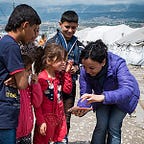Climate-risk-informed development for food security
Background & Concept Note
WFP and its partners envision a world in which all people, including future generations, are well-nourished and food secure and in which food systems can absorb and manage emerging patterns of risk. At the centre of resilient food systems are resilient communities that can adapt to a growing number of climate shocks and stresses.
Yet we are living in a world in which the poorest and most food insecure communities are most affected by the adverse effects of climate change. A concerted effort is necessary to implement the principle of risk-informed development, which integrates disaster risk reduction and climate change adaptation activities and reduces humanitarian needs before they arise.
Against this backdrop, WFP is aiming to harness the power of partnerships to help countries make the transition from reactive and repetitive crisis response to more forward-looking and anticipatory risk management.
Objective
The Annual Partnership Consultation will allow WFP and its partners to discuss strategies to transform vulnerable food systems in a changing climate and strengthen the livelihoods of communities most at risk. We aim to exchange knowledge about risk-informed development strategies, bridge research and policy gaps, and establish partnerships that allow for timely action at scale.
The event also provides an opportunity to update partners on WFP’s actions related to de-risking lives and agriculture (so reducing the need for humanitarian assistance):
- Supporting disaster-risk reduction efforts in vulnerable communities through early-warning systems, food security and climate risk assessments, adaptive social protection, and the creation of assets to enhance resilience and diversify livelihoods
- Reinforcing agricultural productivity and incomes by providing inputs and training on climate-resilient agricultural practices
- Providing decision-makers with actionable information on climate risks and helping farmers to make the right choices by receiving timely climate information
- Enhancing risk transfer by increased access to weather-indexed insurance
- Furthering prudent risk-taking and building of risk reserves through savings and credit groups
- Strengthening the humanitarian-development nexus, by introducing innovative risk management mechanisms, such as forecast-based financing and sovereign insurance, as well as multi-year resilience building programmes after a climate shock.
Expected outcomes
- Experience-sharing on the mainstreaming of climate risk analysis and management in development programmes
- Renewed commitment to partnerships to share assessments of complex threats and risks (hazards, exposure, vulnerabilities, capacities) in order to provide an evidence-base for climate risk-informed programmes, and sustainable and resilient development at national, sub-national, sectoral and community levels.
